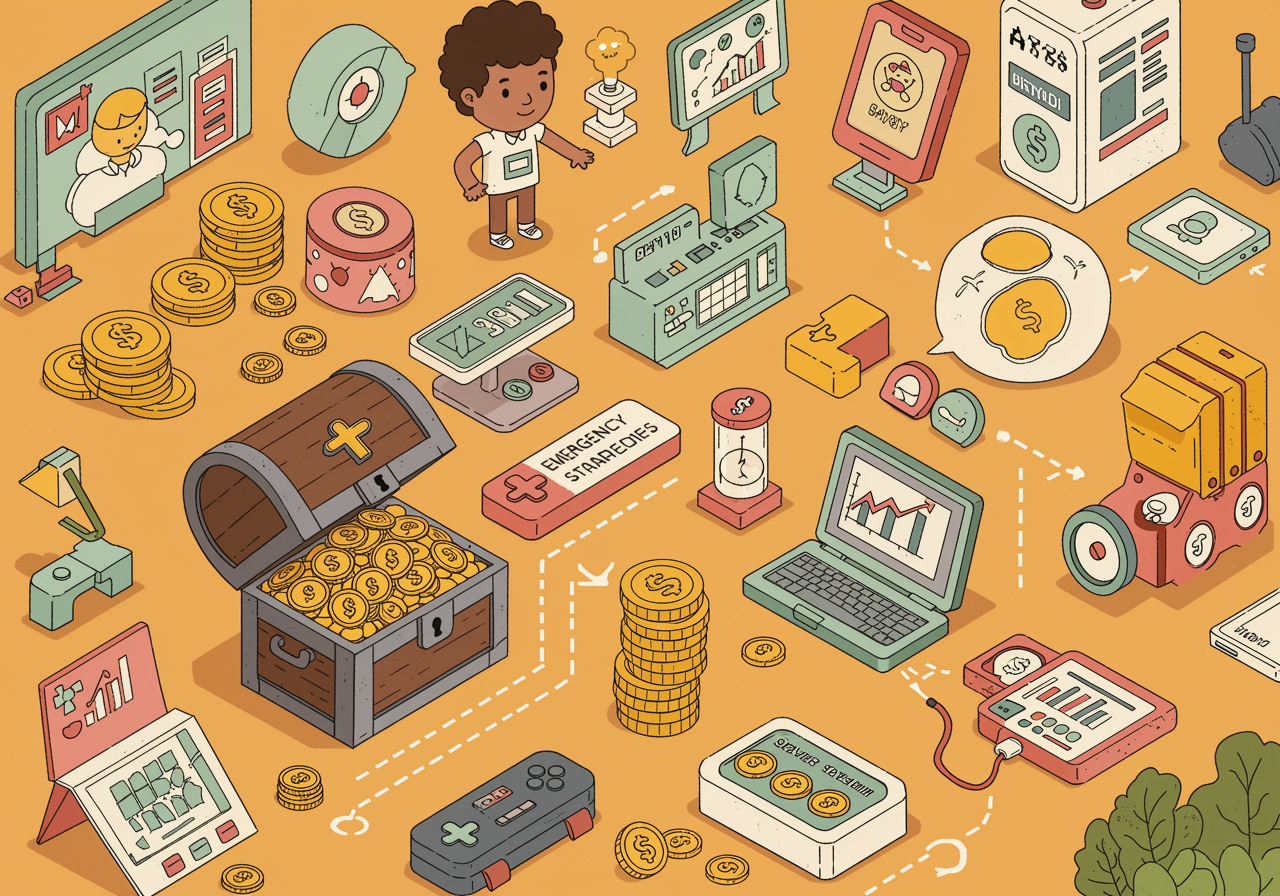Life’s Plot Twists: How Smart Families Plan for Financial Surprises
Why having a money backup plan is like saving your video game progress
Discover how unpredictable life events shape the way families think about and plan their financial futures together.
Overview
Life loves throwing curveballs – from surprise medical bills to job changes to global events that shake up the economy. Just like you wouldn't start a difficult video game level without saving your progress first, families need to think about financial planning as preparing for the unexpected. This topic helps children understand why adults sometimes seem worried about money and how smart planning can turn scary surprises into manageable challenges. It's about learning that uncertainty isn't something to fear, but something to plan for intelligently.

Understand in 30 Seconds
Get up to speed quickly
- Life is Unpredictable: Just like weather forecasts can be wrong, life throws unexpected events our way that can cost money we didn't plan to spend.
- Emergency Funds are Like Save Points: Smart families keep extra money saved up, just like creating save points in a video game before a boss battle.
- Flexibility Beats Perfection: The best financial plans aren't rigid rules but flexible guidelines that can adapt when life changes direction.
- Learning from Surprises: Every unexpected event teaches families something new about what they might need to prepare for next time.
Real Life Scenario
Situations you can relate to
Imagine you're planning an epic summer vacation with your family. You've saved up for months, researched the perfect hotel, and mapped out all the cool places you want to visit. Then – plot twist! – your car breaks down two weeks before the trip, and the repair costs $1,500. What happens next? If your family only saved exactly what the vacation cost, you might have to cancel the whole thing. But what if they had saved an extra 20% 'just in case'? Or what if they had different backup plans ready? Maybe you could take a shorter trip, find a cheaper hotel, or even turn it into a fun road trip adventure closer to home. This is exactly how unpredictability affects financial planning – it's not about predicting every possible problem, but about being flexible enough to handle surprises without giving up on your goals entirely.

Role Play
Spark a conversation with “what if” scenarios
What if your family won $5,000 in a contest tomorrow?
- Role play: Act out a family meeting where you debate whether to spend it immediately, save it all, or split it between fun and savings. Each person argues for a different approach.
What if one parent suddenly lost their job but found a new one that paid 30% less?
- Role play: Role-play a family budget restructuring session where you identify which expenses are 'needs' versus 'wants' and brainstorm creative ways to maintain your lifestyle.
What if a natural disaster damaged your home and you had to live somewhere else for three months?
- Role play: Practice creating an emergency action plan, including what financial resources you'd need and how you'd access them quickly.
FAQs
Frequently asked questions people want to know
How much money should families save for emergencies?
Most experts suggest 3-6 months of living expenses, but any amount is better than nothing. Think of it like leveling up – you start small and build over time.
What's the difference between saving and investing when life is unpredictable?
Savings are like your defensive shields – safe and accessible for emergencies. Investments are like power-ups that might grow over time but come with more risk.
Should families avoid taking any financial risks because life is unpredictable?
Not at all! Smart families take calculated risks while having backup plans. It's like trying a challenging video game level – you take risks but save your progress first.
Examples in the Wild
See how this works day to day
- During the COVID-19 pandemic, families with emergency savings were better able to handle job losses and unexpected expenses than those without financial cushions. (Federal Reserve Economic Data)
- After Hurricane Ian in 2022, families who had diversified income sources and emergency funds recovered financially much faster than those who relied on single income streams. (FEMA Disaster Recovery Reports)
- The 2023 banking instabilities showed how families with money spread across different institutions were less affected than those with all funds in single banks. (Wall Street Journal Banking Coverage)
- Tech companies laying off workers in 2022-2023 reminded families that even 'stable' industries can face sudden changes, making emergency planning crucial. (Bureau of Labor Statistics)
In Summary
What you should know before you start
- Unpredictability is a normal part of life that smart families prepare for rather than fear
- Emergency savings act like financial save points that give families options when surprises happen
- Flexible financial plans work better than rigid ones because they can adapt to changing circumstances
- Every unexpected event is a learning opportunity to improve future financial planning strategies
Pro-tip for Parents
You got this!
When your teen seems overwhelmed by financial uncertainty, remind them that adults don't have all the answers either – that's exactly why we plan together as a family. Share a time when unexpected expenses affected your family and how you handled it. This normalizes uncertainty while showcasing problem-solving skills. Avoid making financial stress seem scarier than it is, but don't downplay real challenges either. Focus on the fact that preparation and teamwork make surprises manageable, not catastrophic.

Keep an Eye Out For
Find these examples in everyday life
- News stories about economic changes or job market shifts that affect families in your community
- When friends or family members experience unexpected financial challenges – these become real-world teaching moments
- Changes in your own family's financial situation that you can use as examples of adaptation and planning
Explore Beyond
Look up these related research topics
- How insurance works as a form of financial protection against unpredictable events
- The psychology of risk-taking and why different people have different comfort levels with uncertainty
- How different cultures and countries approach financial planning and emergency preparedness